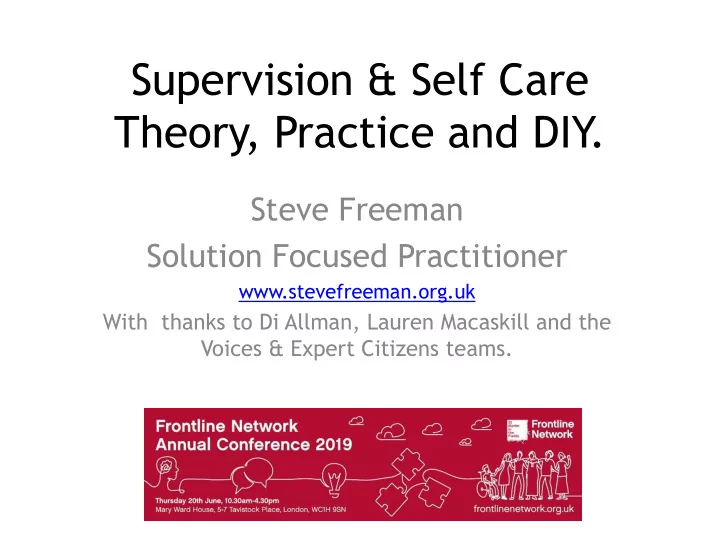

Supervision & Self Care Theory, Practice and DIY . Steve Freeman Solution Focused Practitioner www.stevefreeman.org.uk With thanks to Di Allman, Lauren Macaskill and the Voices & Expert Citizens teams.
Scope of the workshop • Based on limited supervision, debrief etc. • Ideas on self/mutual support. • Take away tools. • Assumed competence. • “It’s the things you know that you don’t know that make the difference” • Unashamedly solution focused! Free resouces. www.stevefreeman.org.uk
A personal note..... • Money cannot be an excuse for lack of support. • Would manual workers be asked to work without guards, safety wear because of cost? • If working without supervision is a good idea then we may as well start cleaning chimneys with small children. Free resouces. www.stevefreeman.org.uk
What works for you? • When do you cope (well & better)? • What do you do when supervision is absent/limited? • Is there a target for being well? • Does it have to be 100%? • What is your good enough? • What examples do you have of formal and informal support that works? Free resouces. www.stevefreeman.org.uk
What other people do.... • From previous discussions with teams; • Feeding and talking to ducks in the park, • Discussion with radio DJ when driving home, • Shrieking Tree, Chinese Garden. • Gym + exercise and people, • Meditation, • Peer support debrief doesn’t do harm, Free resouces. www.stevefreeman.org.uk
Physical Harm and Benefit • Less support = More stress = • Insomnia. • Aches and pains. • Lethargy. • Impaired immune system. • Reduced exercise. • Reduced physical contact. • Use of alcohol, caffeine, nicotine, food. Free resouces. www.stevefreeman.org.uk
Vicious or Beneficent Cycle? Home Self Travel Work Social Free resouces. www.stevefreeman.org.uk
The Willow Principle • Oak trees are strong and unyielding. • Willow trees flex with the wind. • Oak trees shed acorns nearby. • Willow propogate widely. • Which last longest? • Which do you want to be? Free resouces. www.stevefreeman.org.uk
Context. • “At all times we must remember that we work in a high risk environment. Our actions would be viewed differently if we worked in surgery” • Dr. Xenophon Sgouros, Psychiatrist. • Isn’t the need for support, debrief and supervision natural? Free resouces. www.stevefreeman.org.uk
Person v Problem. • For the people you work with and ourselves. • If we focus on the problems we will be overwhelmed. • When we focus on the person we feel more optimistic and less stressed. • This is contagious and evidence based. • A form of (in)formal systems & culture change. Free resouces. www.stevefreeman.org.uk
The Paradox of Selfishness. • Look after today and you’ll have a tomorrow. • The long term aim is self preservation. • This is counter intuitive and counter cultural. • “Can we afford not to look after ourselves?” • Short term losses and long term gains. Free resouces. www.stevefreeman.org.uk
Affordability • BioPsychoSocial and Financial. • Can we afford not to care for ourselves? • Cost to self, significant others, services we work for, services we access. • Cost to the very people we want to help. • An issue for managers, commissioners & staff. • Culture change. • Delegating upwards. Free resouces. www.stevefreeman.org.uk
Ten Minute Talk (Kidge Burns) • 1. What are your best hopes for this conversation? • 2. Suppose that you achieve those best hopes.What will be different? ● What else? • 3. Who will be first to notice? Who else? • 4. On a scale of 1 to 10 Where are you now? ● Where do you want to be? ● What will be different when you are one step higher on the scale? • 5. What are you already doing that is on useful? ● What else are you doing that is useful? • 6. What is the next small step? What else? • 7. Feedback “I’ve noticed that.....” Free resouces. www.stevefreeman.org.uk
Being the best we can..... • Yvonne Dolan. • “What is the best you can be in today’s environment?” Rich description. • “Who will notice when you’re at your best?” • “What will they notice?” “What else?” • “What small changes....?” • A both:and approach. Best and Fun. Free resouces. www.stevefreeman.org.uk
Before you go to sleep tonight...... • List 3 things that have gone well today. • Predictive statements. • Can be general or small and specific. • “Tomorrow will be a good day” • “I’ll do a bit more tomorrow” • “ I will be happier tomorrow” • One off or a series until things change. • What statements might you make? Free resouces. www.stevefreeman.org.uk
Next Steps. • What would you like to change? • What would have to happen.....? • What resources will be important in achieving this? • What are the common resources across all the most important things? • Which are the most important resources? • Who will notice the change? Who else? Free resouces. www.stevefreeman.org.uk
Thank you and Travel well. Free resouces. www.stevefreeman.org.uk
Recommend
More recommend